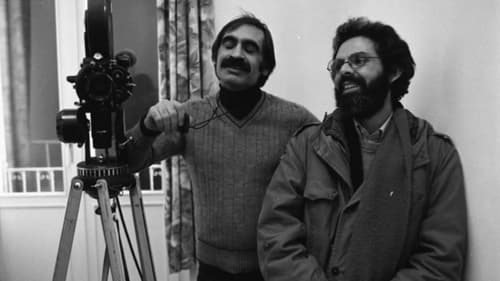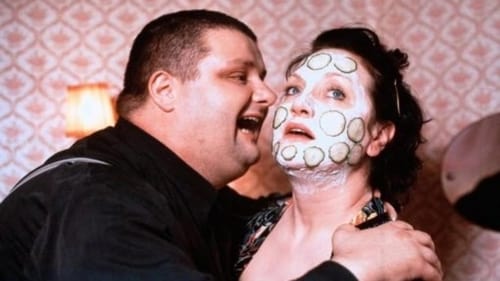
Sohrab Shahid Saless
Nacimiento : 1944-06-28, Qazvin, Iran
Muerte : 1998-07-02
Historia
Sohrab Shahid-Saless was born in Tehran in 1944 to a middle-class family and lived in Tehran. Saless was a storyteller as a child, with a passion for visualizing his narrations. In 1963, Shahid Saless left Iran for Vienna, where he attended a film school and an acting school at the same time, but his studies were discontinued there in 1967 due to a sudden diagnosis of tuberculosis. In the midst of treatment, he left for Paris to continue his film studies at the prestigious Independent Conservatory of French Cinema, and shortly thereafter, in 1968, he returned to Iran. Upon his return to Tehran, Shahid Saless began work with the Iranian Ministry of Culture as a documentary filmmaker, where he produced multiple short films and documentaries, partly on the topic of traditional dance amongst different Iranian ethnic groups. In the course of his stay in Iran (1968–74), he produced two major feature films, Yek ettefāq-e sāda (A Simple Event, 1973) and Ṭabiʿat-e bijān (Still Life, 1974), both of which won major international awards for their social realist depiction of life in Iran and for their innovative cinematographic and experimental style.Shahid Saless also made several short films for the Ministry of Culture and Arts. He made many commissioned films on the local folkloric dances of various ethnic groups. He also started making short documentaries depicting the unnerving condition of life among the working class. Unsurprisingly, the political subversive message of these films was disliked by the government, and Shahid Saless was forced to leave the country. Settled in Germany in 1974, Shahid Saless started producing documentaries for the German media. The movies he made gained him further international recognition, and he continued making documentary and feature films for major German television programs. He made his last movie, Rosen für Afrika, in 1991 for German television. In 1992, he left Germany for the United States to join his family. He died from a chronic illness related to his liver from which he suffered throughout his life.
Shahid Saless is known to be a pioneer of the new wave of Iranian cinema. In his own words, his cinema intends to document the “antagonism between man and society”. In the course of his oeuvre, he viewed the role of cinema as “to make conscious of indignity and inhumanity of life".

Himself
Meteor: Sohrab Shahid Saless by Mahmoud Behraznia is a documentary with a different perspective on Sohrab Shahid Saless, a leading Iranian filmmaker. Someone whose viewpoint at cinema and the special type of aesthetics he used in his films has been a path-breaker for many Iranian filmmakers. The film provides the viewer with new information about the life and work of Sohrab Shahid Saless in Germany.

Filmmaker Mehrnaz Saeed-Vafa interviews the veteran filmmaker three weeks before his death in an effort to introduce American cinephiles to his life and work. In addition, Saeed-Vafa skillfully uses film clips to illustrate the haunting quality of Saless' work and the impact it has had on generations of Iranian filmmakers.

Writer
A psychodrama about how injustice is turned into oblivion about an opportunity worker and a woman from the civil house of a marriage for 30 years . Soon the relationship fails due to the aggressive, also destructive tendencies of the man who enters a deep personal crisis. When the marriage coined/shaped of force and Psychoterror goes finally into the breaks, the man looks for comfort in the alcohol and becomes criminal.

Director
A psychodrama about how injustice is turned into oblivion about an opportunity worker and a woman from the civil house of a marriage for 30 years . Soon the relationship fails due to the aggressive, also destructive tendencies of the man who enters a deep personal crisis. When the marriage coined/shaped of force and Psychoterror goes finally into the breaks, the man looks for comfort in the alcohol and becomes criminal.

Screenplay
Left behind by his mother, an alcoholic prostitute, Georg grew up carelessly with his aunt and grandmother. As an adult he works in a department store canteen and has become an outsider due to his shape and infantile appearance.

Director
A married couple adopts a child. The mother's relashionship with the new family member quickly deteriorates.

Writer
A young man lives through the end of World War II

Director
A young man lives through the end of World War II

Director
It's about an old man, a crime, bureaucracy and remorse

Writer
A treatise on love and desire tainted by harsh reality of capitalism, in which submission to the laws of lust-as-commerce is played out by five prostitutes and their pimp, who pits them against one another so that they are incapable of standing up to him collectively.

Director
A treatise on love and desire tainted by harsh reality of capitalism, in which submission to the laws of lust-as-commerce is played out by five prostitutes and their pimp, who pits them against one another so that they are incapable of standing up to him collectively.

Writer
A woman leaves his husband and starts living with a turkish man.

Director
A woman leaves his husband and starts living with a turkish man.

Writer
Documentary on the life of Cechov.

Director
Documentary on the life of Cechov.

Writer
Herbert (Heinz Lieven) is a solid, middle-class engineer who one day quits his job and ensconces himself at home (preferably in the bathroom), refusing to say very much to anyone. His wife (Dorothea Moritz ) is all the more upset at his behavior because on Sunday mornings he goes out into the street and yells at the top of his lungs for everyone to "get up." Eventually, the hard-working wife who is also earning their support convinces Herbert to go to a clinic for treatment. But is it a clinic he needs? Or is Herbert rebelling against a society that is too ordered, too sterile, too buried in the monotony of routine?

Director
Herbert (Heinz Lieven) is a solid, middle-class engineer who one day quits his job and ensconces himself at home (preferably in the bathroom), refusing to say very much to anyone. His wife (Dorothea Moritz ) is all the more upset at his behavior because on Sunday mornings he goes out into the street and yells at the top of his lungs for everyone to "get up." Eventually, the hard-working wife who is also earning their support convinces Herbert to go to a clinic for treatment. But is it a clinic he needs? Or is Herbert rebelling against a society that is too ordered, too sterile, too buried in the monotony of routine?

Director
Iranian director Sohrab Shahid Saless has succeeded in taking on an unusual project — the life and times of a German literary figure — and making it interesting. Christian Dietrich Grabbes lived a very short life in the first half of the 19th century and is primarily known for his satire, skepticism, basurd theater and the fact that he presaged the Postmodern movement in literature. Hannibal and Don Juan and Faust are two of his better-known works. In this docudrama, his Comedy, Satire, Irony and Deeper Meaning is featured partly because it gives a drubbing to the icons of German thought that had a stranglehold on the creative process. One memorable moment in this three-and-a-half-hour story is when the alcoholic writer is caught in the throes of delirium and comes around to see his own mother as a figure of death. The irony is that an Iranian director could capture the spirit and age of a German writer so well

Writer
Directed by Sohrab Shahid Saless.

Director
Directed by Sohrab Shahid Saless.

Writer
A diary of a lonely 30 year old man who works as a butcher in a supermarket. The movie shows his daily life between the supermarket and his flat. His ability to communicate is limited. From time to time his mother visits him. But his relationship to her is rather reserved. Constantly he's waiting for his girlfriend which is not visiting him anymore after they had a fight.

Director
A diary of a lonely 30 year old man who works as a butcher in a supermarket. The movie shows his daily life between the supermarket and his flat. His ability to communicate is limited. From time to time his mother visits him. But his relationship to her is rather reserved. Constantly he's waiting for his girlfriend which is not visiting him anymore after they had a fight.

Writer
A young boy learns of his mother's occupation while trying to save money for a bicycle.

Director
A young boy learns of his mother's occupation while trying to save money for a bicycle.

Writer
This drama explores the grim lives of Turkish “guest workers” living in Germany.

Director
This drama explores the grim lives of Turkish “guest workers” living in Germany.

Screenplay
A minimalist study of lonely, isolated existence. Mohamad Sardari has spent thirty years at a remote outpost raising and lowering a gate to keep road traffic from crossing tracks when a train passes. He lives with his wife in an unadorned shack; a few bare trees dot the threadbare landscape.

Director
A minimalist study of lonely, isolated existence. Mohamad Sardari has spent thirty years at a remote outpost raising and lowering a gate to keep road traffic from crossing tracks when a train passes. He lives with his wife in an unadorned shack; a few bare trees dot the threadbare landscape.

Screenplay
The story of a ten years old Iranian schoolboy living with his mother and his father in Northern coasts of Iran. The boy helps his father in selling the latter's illegal fishing and helps his mother in shopping for her and bringing home water from a well. The three characters live together in only one room. Their life is austere. The boy eats only bread and milk every day... One day the boy's mother dies.

Director
The story of a ten years old Iranian schoolboy living with his mother and his father in Northern coasts of Iran. The boy helps his father in selling the latter's illegal fishing and helps his mother in shopping for her and bringing home water from a well. The three characters live together in only one room. Their life is austere. The boy eats only bread and milk every day... One day the boy's mother dies.

Editor
Set on the southern coast of Iran, "Harmonica" begins as a young boy receives a musical present from abroad. Fascinated and envious, his friends make him the leader of the pack, as they compete for the privilege of holding the harmonica or even blowing a few notes, until the games and horseplay begin to take on a sinister edge.

Editor
Short film made with stop motion animation techniques.

Writer
Short film made with stop motion animation techniques.

Director
Short film made with stop motion animation techniques.

man waiting for the bus (uncredited)
This movie takes a unique look at Baghtcheban School, the special school for deaf children, how it deal with teaching the kids and how they lives are effected by it.






